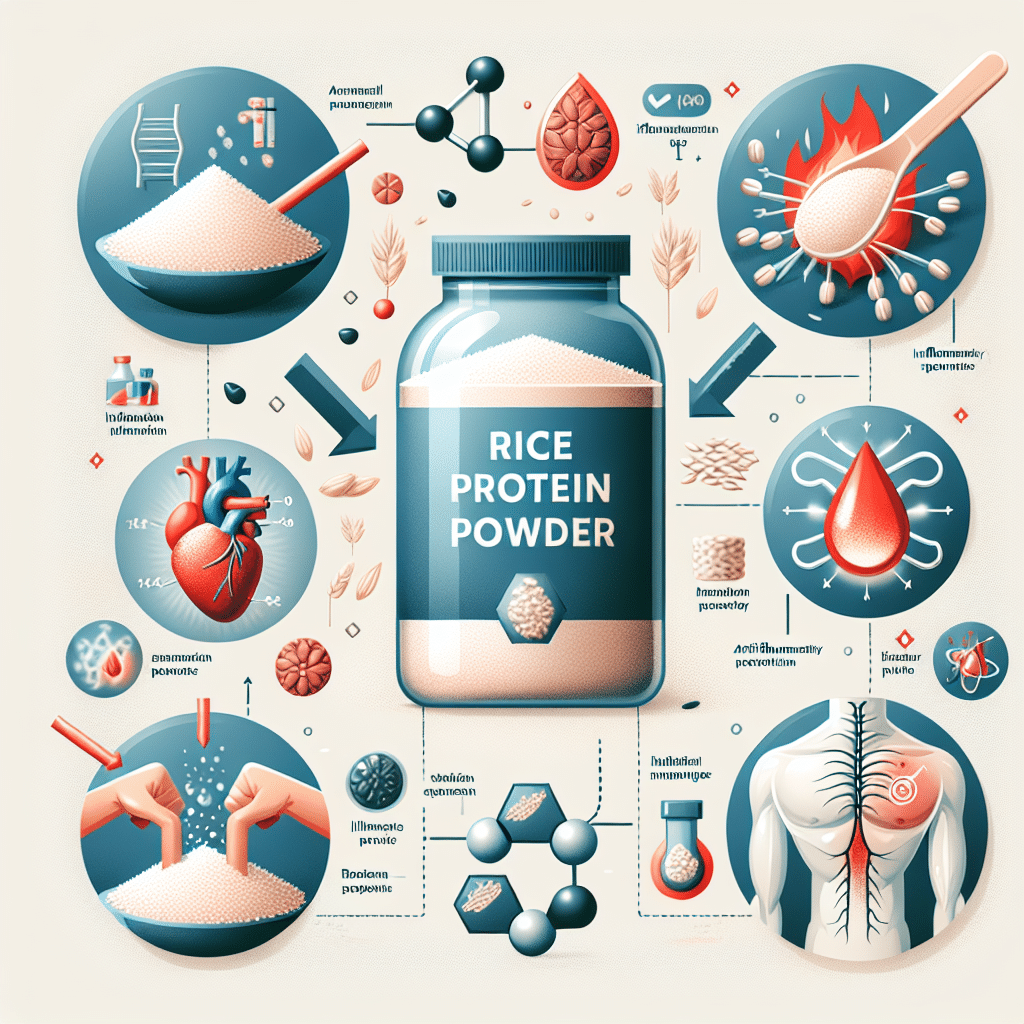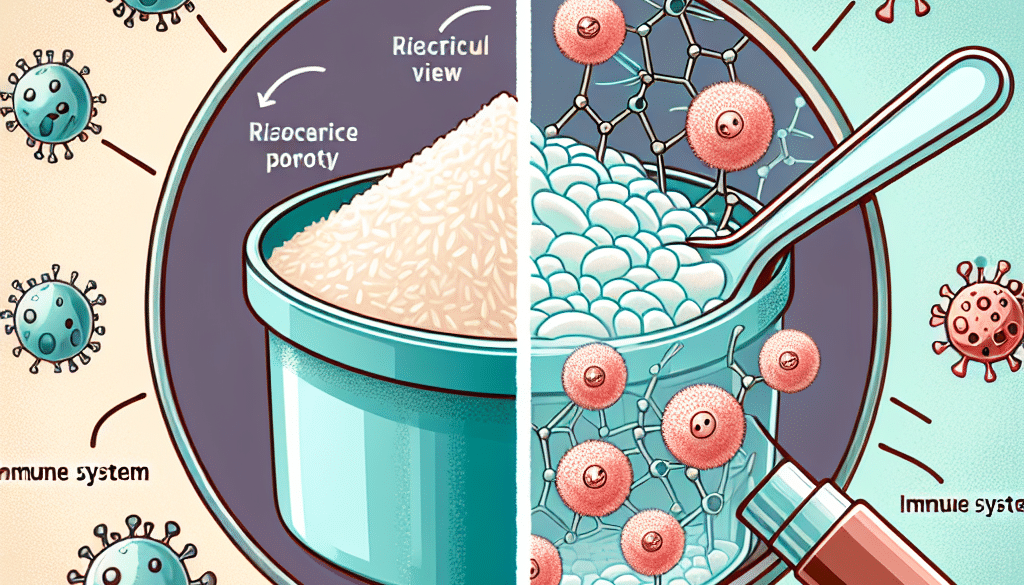Is Rice Protein Powder Inflammatory?
-
Table of Contents
- Rice Protein Powder: Is It Inflammatory or a Healthy Alternative?
- Understanding Inflammation and Dietary Proteins
- The Composition of Rice Protein Powder
- Is Rice Protein Powder Inflammatory?
- Comparing Rice Protein to Other Protein Sources
- Case Studies and Research on Rice Protein
- Practical Tips for Incorporating Rice Protein Powder
- Conclusion: Rice Protein Powder as a Non-Inflammatory Protein Source
- Discover ETprotein’s High-Quality Rice Protein Products
Rice Protein Powder: Is It Inflammatory or a Healthy Alternative?

Protein powders have become a staple in the diets of athletes, bodybuilders, and health-conscious individuals. Among the various types of protein powders available, rice protein powder has gained popularity as a plant-based alternative to whey and soy proteins. However, with the rise in its usage, questions regarding its inflammatory properties have surfaced. This article delves into the science behind rice protein powder and its effects on inflammation.
Understanding Inflammation and Dietary Proteins
Inflammation is the body’s natural response to protect itself against harm. There are two types of inflammation: acute and chronic. Acute inflammation is a short-term response with localized effects, while chronic inflammation can be long-term and contribute to various diseases.
Dietary proteins can influence inflammation in the body. Some proteins may trigger an inflammatory response, while others may have anti-inflammatory properties. The source and composition of the protein are critical factors in determining its impact on inflammation.
The Composition of Rice Protein Powder
Rice protein powder is typically made from brown rice and is considered a complete protein as it contains all nine essential amino acids. It is also hypoallergenic, making it a suitable option for individuals with allergies to dairy, soy, or gluten.
Is Rice Protein Powder Inflammatory?
Studies on rice protein powder suggest that it is not inherently inflammatory. In fact, rice protein may have certain anti-inflammatory properties:
- Amino Acid Profile: Rice protein contains a good balance of amino acids, including a high proportion of arginine, which is known for its role in immune function and wound healing.
- Antioxidant Content: Brown rice protein includes compounds with antioxidant properties, which can help reduce oxidative stress and inflammation.
- Hypoallergenic Nature: Since rice protein is hypoallergenic, it is less likely to cause an allergic reaction that could lead to inflammation.
However, individual responses to protein powders can vary, and it’s essential to consider personal dietary sensitivities and health conditions.
Comparing Rice Protein to Other Protein Sources
When compared to other protein sources, rice protein powder holds its own as a non-inflammatory option:
- Whey Protein: While whey protein is a complete protein and has been shown to have anti-inflammatory effects, it can cause inflammation in individuals with lactose intolerance or dairy allergies.
- Soy Protein: Soy protein is another complete protein but can be problematic for those with soy allergies and may have estrogenic effects due to its isoflavones content.
- Pea Protein: Pea protein is also hypoallergenic and has a favorable amino acid profile, making it another good alternative for those seeking non-inflammatory protein sources.
Choosing the right protein powder depends on individual health goals, dietary restrictions, and preferences.
Case Studies and Research on Rice Protein
Several studies have examined the effects of rice protein on health and inflammation. For instance:
- A study published in the Nutrition Journal found that rice protein supplementation post-exercise could aid in recovery and reduce inflammation markers as effectively as whey protein.
- Research in the Journal of Agricultural and Food Chemistry highlighted the presence of peptides in rice protein that may have anti-inflammatory and antioxidative effects.
These studies suggest that rice protein powder can be a beneficial part of a diet aimed at reducing inflammation.
Practical Tips for Incorporating Rice Protein Powder
For those interested in adding rice protein powder to their diet, here are some practical tips:
- Choose organic and non-GMO rice protein powders to avoid potential contaminants that could cause inflammation.
- Integrate rice protein powder into a balanced diet rich in fruits, vegetables, and whole grains to enhance its anti-inflammatory potential.
- Use rice protein powder in smoothies, baking, or as a supplement to meals to increase protein intake without contributing to inflammation.
Conclusion: Rice Protein Powder as a Non-Inflammatory Protein Source
In conclusion, rice protein powder is not considered inflammatory and may serve as a beneficial protein source for those looking to manage inflammation through diet. Its hypoallergenic nature, antioxidant content, and balanced amino acid profile make it a viable option for many individuals. As with any dietary supplement, it’s essential to consider personal health needs and consult with a healthcare professional before making significant changes to your diet.
Discover ETprotein’s High-Quality Rice Protein Products
If you’re looking for a reliable source of rice protein powder, ETprotein offers a range of high-quality protein products. Their organic rice protein is characterized by a neutral taste, non-GMO, and allergen-free attributes, making it an excellent choice for those seeking a non-inflammatory protein source. With purity levels over 98%, ETprotein’s products cater to various industries, including nutraceuticals, pharmaceuticals, and food and beverage.
ETprotein’s commitment to quality and customer satisfaction makes them a trusted supplier for your protein needs. To explore their offerings and learn more about how their rice protein can fit into your anti-inflammatory diet, contact ETprotein and email sales(at)ETprotein.com today.
About ETprotein:
ETprotein, a reputable protein and L-(+)-Ergothioneine (EGT) Chinese factory manufacturer and supplier, is renowned for producing, stocking, exporting, and delivering the highest quality organic bulk vegan proteins and L-(+)-Ergothioneine. They include Organic rice protein, clear rice protein, pea protein, clear pea protein, watermelon seed protein, pumpkin seed protein, sunflower seed protein, mung bean protein, peanut protein, and L-(+)-Ergothioneine EGT Pharmaceutical grade, L-(+)-Ergothioneine EGT food grade, L-(+)-Ergothioneine EGT cosmetic grade, L-(+)-Ergothioneine EGT reference grade and L-(+)-Ergothioneine EGT standard. Their offerings, characterized by a neutral taste, non-GMO, allergen-free attributes, with L-(+)-Ergothioneine purity over 98%, 99%, cater to a diverse range of industries. They serve nutraceutical, pharmaceutical, cosmeceutical, veterinary, as well as food and beverage finished product distributors, traders, and manufacturers across Europe, USA, Canada, Australia, Thailand, Japan, Korea, Brazil, and Chile, among others.
ETprotein specialization includes exporting and delivering tailor-made protein powder and finished nutritional supplements. Their extensive product range covers sectors like Food and Beverage, Sports Nutrition, Weight Management, Dietary Supplements, Health and Wellness Products, and Infant Formula, ensuring comprehensive solutions to meet all your protein needs.
As a trusted company by leading global food and beverage brands and Fortune 500 companies, ETprotein reinforces China’s reputation in the global arena. For more information or to sample their products, please contact them and email sales(at)ETprotein.com today.














